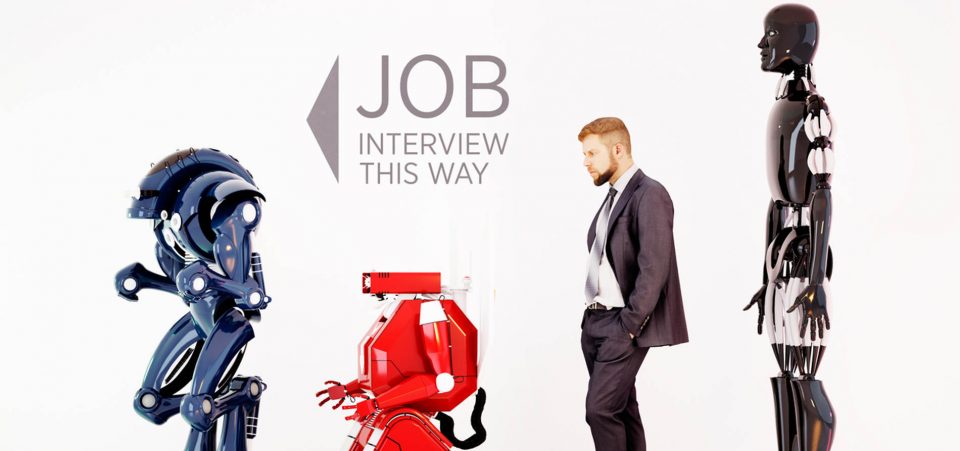Will Robots Take 40% of U.S. Jobs in the Next 15 years?
A hand approaches a spool of wire. It touches and grabs it with ease. Each finger doses the right amount of grip and then grabs a small object gently but firmly. It sounds ordinary, except that the description applies to a robot. Today, robots are grabbing small objects. Tomorrow, those same innocent robots will be taking U.S. jobs.
The writing was on the proverbial wall. Robots taking jobs is no longer the plot of a science fiction movie like I, Robot or a Star Wars sequel. R2-D2 and C-3PO are coming to offices and factories near you. Microsoft founder Bill Gates has already thought of one of the economic effects.
Gates has even suggested that robots pay taxes to save U.S. jobs. But the usual consultants and economists are telling him he’s wrong about that. They’re even accusing Gates of having a limited vision, because if there’s a problem in the world, now—say the economists—it’s that there are too few robots working, not too many. (Source: “What’s Wrong With Bill Gates’ Robot Tax,” CNBC, February 28, 2017.)
Many Americans have paid through their nose for education, low-paying jobs, and internships to gain experience. Meanwhile, others have been busy making all those efforts null and void, building robots to replace them. Science fiction is coming faster than we thought. Instead of worrying like the rest of us, those who influence the decision makers want to accelerate the process of making humans useless.
Robots could replace some 40% of all jobs in the United States by 2030. Emigrating to other countries would not solve the dilemma. Robots will take over jobs all over the world. But, the pace of that transition in the United States could be faster than anywhere. That’s because the U.S. has the technology, economic spirit, and fiscal-financial incentives to do so.
Instead of “Making America Great Again,” President Trump—this time through no fault of his own—might oversee the process to make Star Wars great again. George Lucas won’t even have to bother hiring humans. There will be plenty of robots around, needing some leisure time from their jobs, to fill theater seats.
One can only hope the robots come with an on/off switch and work for little more than lubricating oil. The McKinsey Global Institute predicts that 49% of work activities can be automated with existing technologies. Thus, it’s only a matter of time, literally a few years, before the job cuts start coming. Even without robots, the U.S. unemployment rate is already a problem looking for a solution. (Source: “Where machines could replace humans—and where they can’t (yet),” McKinsey & Company, July 2016.)
Robots Could Take Over a Billion Jobs in a Single Generation
This mean that in the course of a single generation, a billion or more jobs (a rough estimate based on the current world population) will be lost to machines. From the millennials to the robots in a decade. Why are so few, other than the usual consultants and economists, happy about this development?
Weren’t robots going to fulfill humanity’s oldest dream: no more work? Perhaps, under a different economic system it might work. Robots performing unpleasant tasks while leaving the stimulating activities to humans does sound good. But, it’s all happening too fast.
No sooner than C-3PO has put on a shirt and tie to show up at the office, he’s also signing up to “OkCupid” to find a girlfriend. Yes, there have already been suggestions that humans could be dating robots by 2050. Now, you might meet some robots who are more interesting than some people in the dating scene. But, it would be difficult to impress them with your fine memory or a fancy meal.
Robotization Is a Perfect Recipe for Mass Poverty
On a more serious note, the process of robots taking over jobs sounds like a perfect recipe of poverty. Robots will inevitably cause the value of work to lose meaning. It will force the devaluation of the dollar, the euro, and all other currencies. The forecast is horrifying, given that existing technologies are already accelerating the pace of robotics innovation.
That means that jobs—the kind still being performed by humans—will start decreasing from year to year, starting now. The rate of increase could be geometric rather than arithmetic. McKinsey says, among many other disturbing prospects, that about 60% of all workplaces can already be automated for about 30% of their functions.
A future of complete automatization has arrived suddenly and quietly on our doorstep. The disruption will be like no other in human history. And if you are a lawyer or a medical doctor, or even a teacher, reading this, unlike recent industrial automation processes, the next generation of robots is coming to get your jobs as well.
Over the next 20 years, robots will take over many intellectual professions, as well as physical jobs. Such a transition won’t even depend on U.S. economic growth. Regardless if growth is at current levels or Chinese levels, the automation of the labor market will become popular because robots are more efficient.
The other aspect to take place, amid an already precarious U.S. unemployment forecast for 2017, is this. The current generation of millennials will experience quantitative and qualitative upheavals unlike any in history perhaps. A huge mass of people will be made to feel like excess baggage both in economic and in human terms.
Consider that the non-manufacturing sector has gradually dropped. Manufacturing accounts for a smaller percentage of economic growth according to the Institute of Supply Management. The higher the index, the better it might be for investing. The graph below shows the opposite.
The New Economy Won’t Need Humans
The new world that robots will build won’t have any need for people to make goods and deliver services. But, the liberation from work is unlikely to deliver the kinds of benefits in leisure that we all expect. What might happen? Perhaps, the humans will fuel a reverse migration trend. They will long to reach for those places where economies of scale and industrialization itself is still at a primitive stage.
The irony will be that youth from the rich countries might be boarding boats in search of meaningful lives in the very places that are fueling the current wave of migrants. This process could begin as early as the next decade. Robotization is not even that new. Many robots are already operating in large-scale manufacturing plants.
But, soon, the robots will arrive in offices. It’s all very human to allow transitions some time. Companies and businesses are understandably cautious when they make a big shift. But, once the shift begins, they won’t change their minds. They simply cannot. Thus, even the dire prediction of 40% of jobs going from humans to robots by 2030 could represent be a low-ball prediction.
The robots will replace us in different and numerous jobs. The current employment rate might seem positively heavenly compared to the numbers that will be coming. It’s hard to believe, but it has started. By 2030, work will be totally different. Robots might be our very bosses, dominating work.
Once the process of robotization begins, governments and those dominating our world, will no longer care about the real unemployment rate. It will be pointless or outdated to discuss such concepts as economic outlook. U.S. Treasury Secretary Steven Mnuchin said he was not worried about the mass displacement of U.S. workers by robots.
Mnuchin said a century will pass before an employment—or unemployment—crisis reaches critical mass. (Source: “Mnuchin on robots taking US jobs: ‘It’s not even on our radar screen … 50-100 more years’ away,” CNBC, March 24, 2017.) But, Mnuchin may not have grasped the scale of this next revolution.
Automation will eliminate jobs. It has already begun. The percentages and the timings may change, but artificial intelligence and automation will not respect anybody’s employment status. The numbers should be a cause for worry. The transition will be especially painful because, automation will start as a partial process.
Robots will start complementing our human activity rather than replace it altogether. But, gradually, we humans will be training the robots that will send us home to permanent retirement. At first, the rate of robots’ integration in an office might be halted by education. The higher the education and expertise level, the higher the longevity of that job and its ability to withstand the change.
Which Sectors Will Be Affected by Robotization? All of Them
There’s nothing new in that. Even today, many jobs in the U.S. economy have ended up abroad. But, the ones requiring the highest level of education or training are always the last to go. The jobs most at risk automation, in fact, are those that require the lowest level of study to be performed.
It’s not hard to predict which sectors face the most risk of automation or robotization now. The hospitality, food service, transportation, and of course, manufacturing sectors might be the first to fall. Waiters won’t be necessary in many fast food restaurants. They already are not, but robots might take orders and hand them at the counter even better than humans.
Uber Technologies, Inc., Alphabet Inc (NASDAQ:GOOGL), and Apple Inc. (NASDAQ:AAPL)—not to mention Tesla Motors (NASDAQ:TSLA) and Mercedes Benz—have been working diligently to bring us driverless cars, driverless buses, and other automated forms of transport. Putting the “Tesla Model S” on self-driving mode might seem cool now, but it will become the norm soon. Driving your own car might be a feature left for the premium models of premium brands, just as riding a horse these days is an activity reserved for the richest people.
The advent of autonomous driving, for example, will force-retire many truck, bus, and taxi drivers. And then, after these factory workers, the natural evolution of robotics will be to perform medical operations. They might be more precise and less prone to mistakes, while sensing biochemical data at a mere touch.
Robocops could be joining human ones soon. The suspects they apprehend might seek legal counsel from robolawyers. Meanwhile, in this rather grim picture that questions the very nature of human existence, President Donald Trump continues to play the tune of boosting employment by ordering American businesses to bring back manufacturing jobs to the U.S. Trump needs a new strategy as he starts to surround himself with robolawyers.








